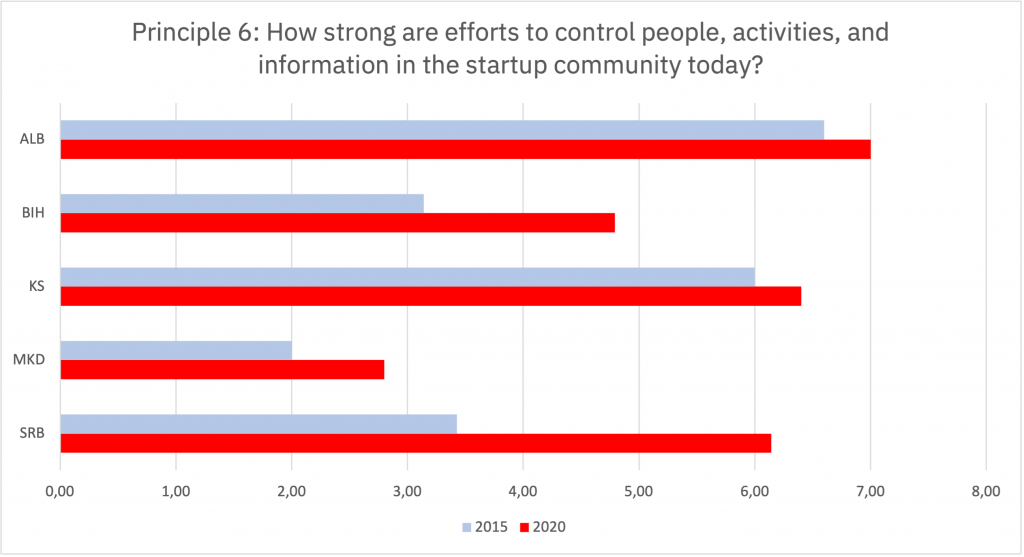Brad Feld declares that a startup community can be guided and influenced but not controlled. Instead of approaching a startup community from the top down, the right conditions should be in place for the community to emerge from the bottom up. It is contra-productive to control people, activities and information. It goes against the spirit of the startup community and may have destructive effects.
We asked our interviewees “how strong are efforts to control people, activities and information in the startup community today?”
On average, the strength of efforts to control is increasing (28% in 5 years) in the Western Balkans—it is a worrying trend. That said, the score varies widely among the countries. In Albania and Kosovo, there is a continuous strong tendency to control efforts. In North Macedonia such efforts, while also increasing, are on a much lower level. In Serbia, the answers point to a significant increase compared to five years ago in the strength with which efforts are made to control people, activities and information in the startup community. And Bosnia & Herzegovina appear to be on the same trajectory as Serbia.
The majority of the interviewees drew a direct parallel between the word ‘control’ and the state, which is indicative as the word ‘state’ was not explicitly mentioned in the question. Clearly, the question hit a nerve, as it touches directly on the precarious relationship between the state and its citizens. To a lesser degree, the interviewees highlighted how individuals, organizations and donor funded projects (perhaps unintentionally) are perceived to control the startup community.

Concerning the state, the answers fall in three categories – negative, positive and neutral:
- Negative. The majority of interviewees see the state’s involvement in the startup space as a means to control what is going on rather than a sign of genuine intent to help entrepreneurs. There is a tendency for the state to get involved when success is achieved by entrepreneurs in the startup community, mainly to become part of the success (or tax it), and not necessarily to fuel it further. According to the interviewees, new legislation appears to emerge without constructive consultation with the startup community, while some legislation has a direct negative impact on startups.
- Positive. A significantly smaller group of interviewees took a more upbeat view of the state’s intentions in getting involved with the startup community, highlighting that dialogue with the state is now much more transparent than five years ago.
- Neutral. The second largest group of the interviewees took a more wait-and-see stand to the state. They are stressing that policy makers showing an interest to get involved with the startup community is a start, but it remains to be seen how well its top-down approach will go down with the community. The neutrals recognize the challenges ahead, highlighting that some in the startup community do not want to communicate with the state, while others know it is necessary to push through changes in legislative and regulatory frameworks. They are not sure of the best way and worried about the reaction by the state.
However, the interviewees did not only zoom in on the state when worrying about actors trying to control the startup communities. They also mentioned individuals, people with years in the space, who are trying to control activities as well as local NGOs, that are well-positioned to help startups but are often reluctant to open up and provide guidance. Some of them felt that the donor community is ‘controlling’ the startup community through its projects and NGOs funding.
Bottom line, there appears to be a worry of the potentially negative influence of the state on the startup community among the interviewees. At the same time, they are keen to highlight their own, bottom-up initiatives, bringing together like-minded people with informal Slack or WhatsApp groups, sharing information without heavy moderation, sometimes around successful verticals such as gaming and blockchain. Again, there is a call for facilitation. There is a need for somebody to build the infrastructure and bring people together. The state cannot and should not do that.




